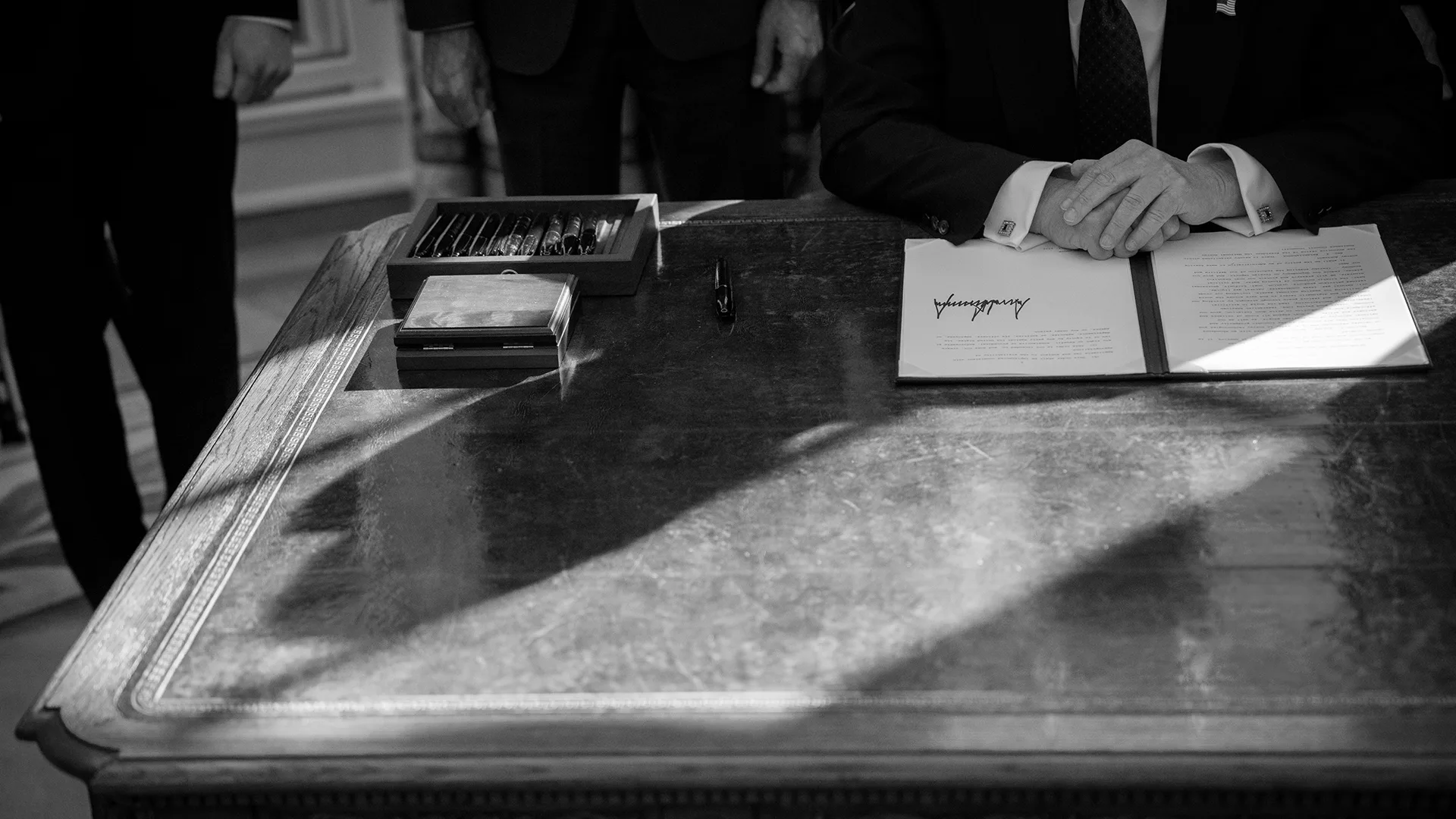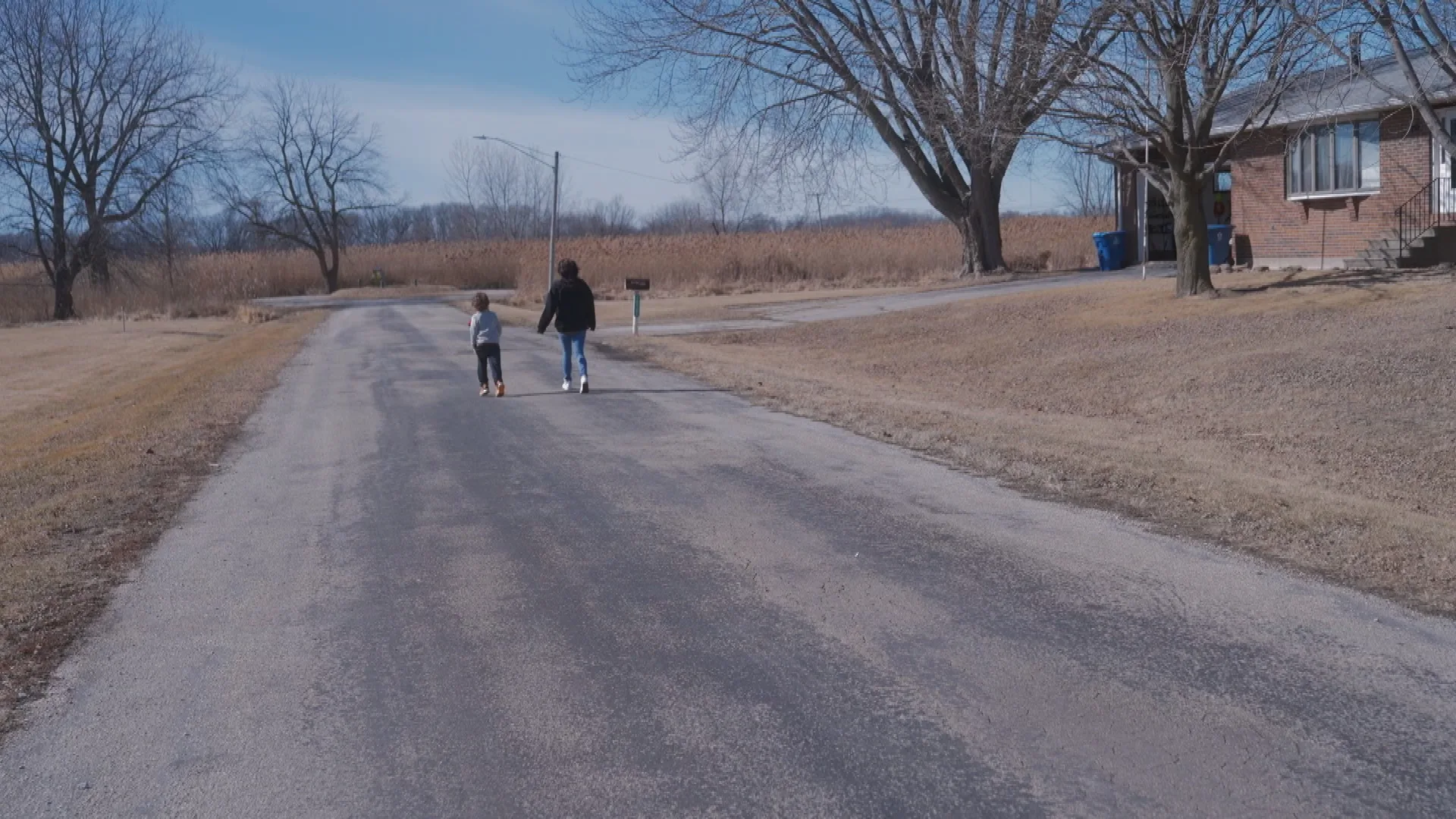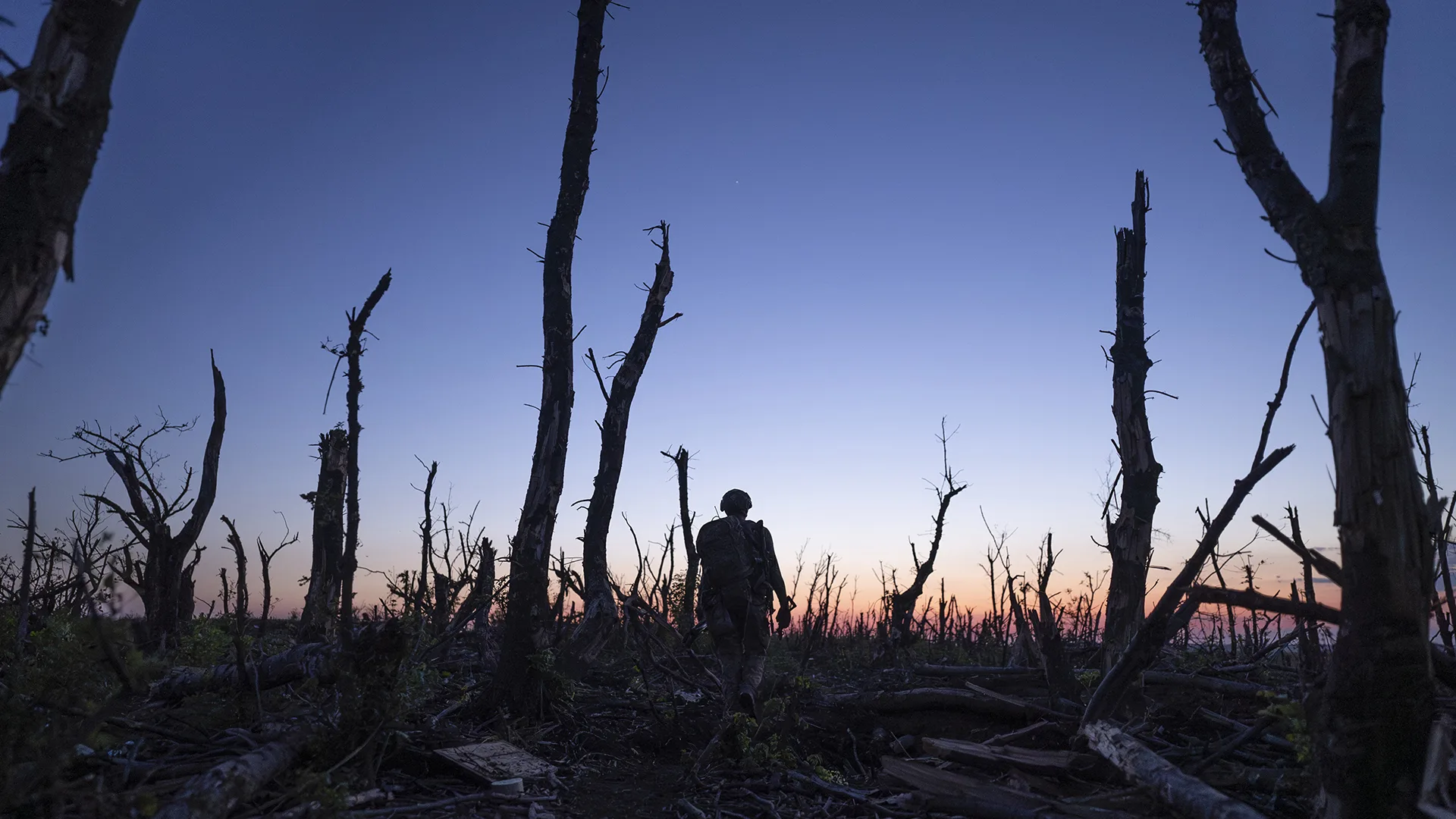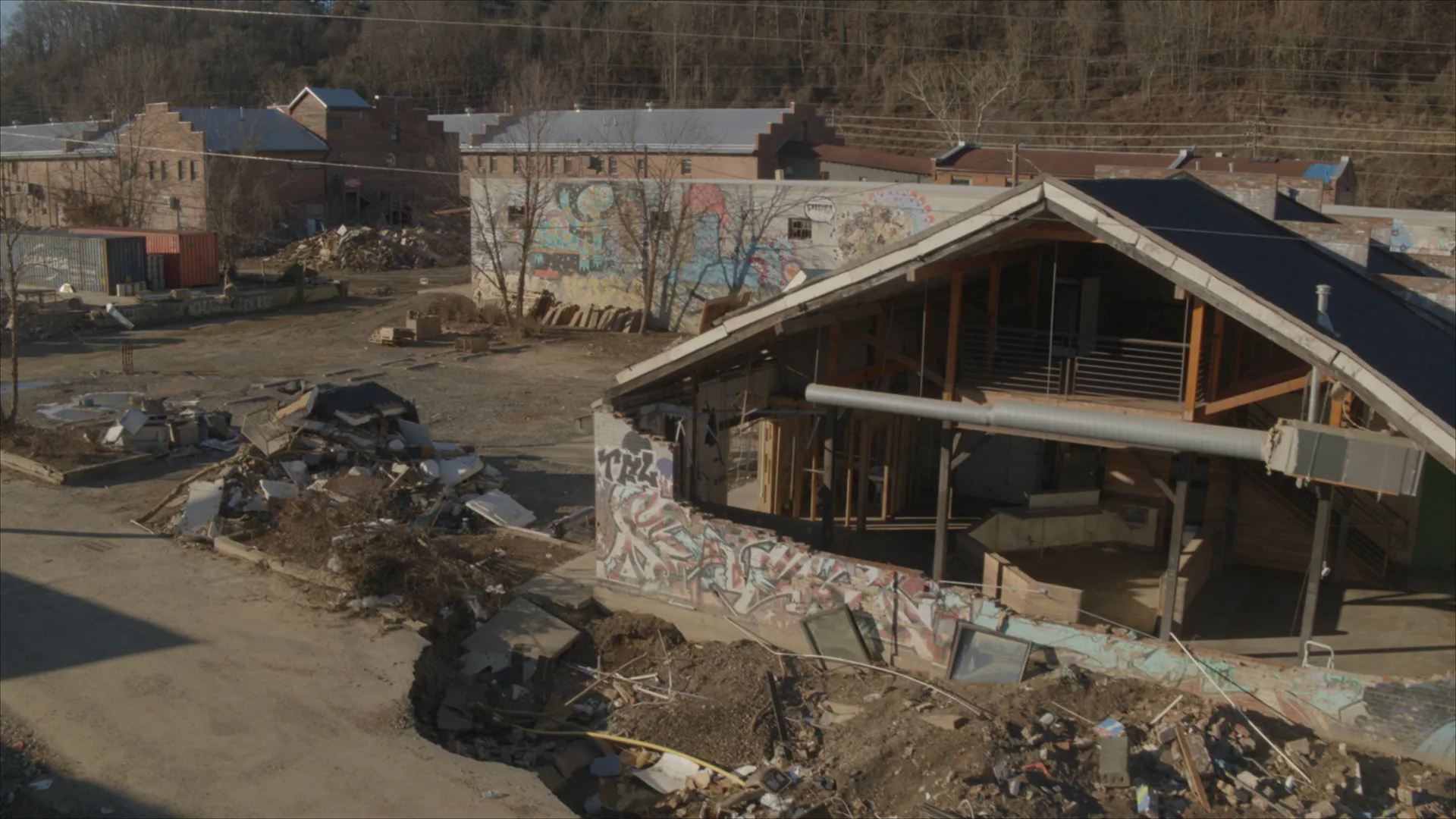Tutwiler
September 5, 2023
33m
A powerful and unforgettable window into the lives of incarcerated pregnant women — and what happens to their newborns
Tutwiler
Tutwiler (2023)
September 5, 2023
33m
NOW PLAYING
Tutwiler (2020)
May 6, 2020
34m
Share
What is it like to give birth — and then be forced to say goodbye to your baby 24 hours later?
To most mothers, it’s a scenario that’s unimaginable. But it’s reality for the dozens of pregnant women behind bars in any given year at Alabama’s notorious Julia Tutwiler Prison for Women.
Tutwiler, a documentary short from FRONTLINE and The Marshall Project, offers a powerful and unforgettable window into the lives of incarcerated pregnant women — and what happens to their newborns.
Directed by Academy Award-nominated filmmaker Elaine McMillion Sheldon (Heroin(e), Recovery Boys) and reported and produced by The Marshall Project’s Alysia Santo, Tutwiler began streaming online on May 6, 2020. An updated version aired on FRONTLINE in a two-part special along with Two Strikes — which examines a little-known “two-strikes” law in Florida — on Sept. 5, 2023.
Produced by
Transcript
Credits
Journalistic Standards
Support provided by:
Learn More
Most Watched
The FRONTLINE Newsletter

For Most Women Who Give Birth in Prison, ‘The Separation’ Soon Follows
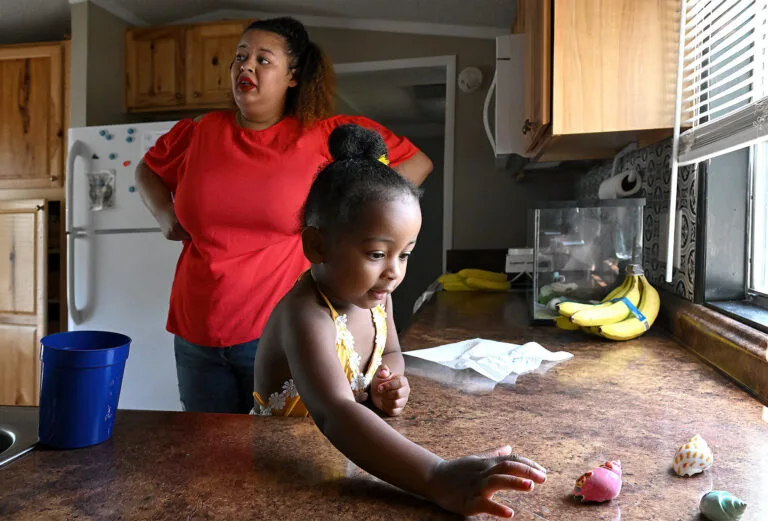
How One Alabama County Declared War on Pregnant Women Who Use Drugs
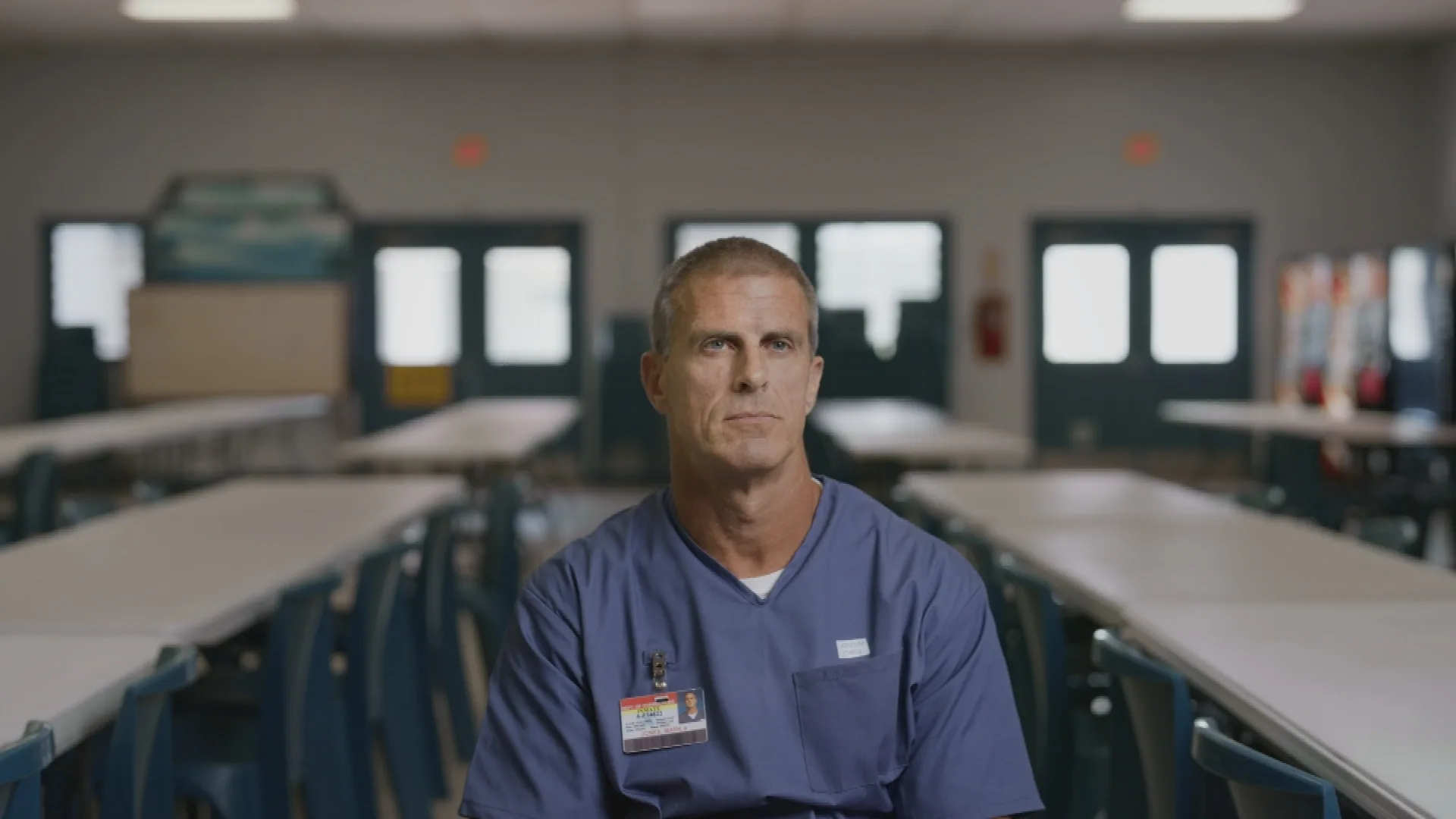
Two Strikes
Related Stories

How One Alabama County Declared War on Pregnant Women Who Use Drugs
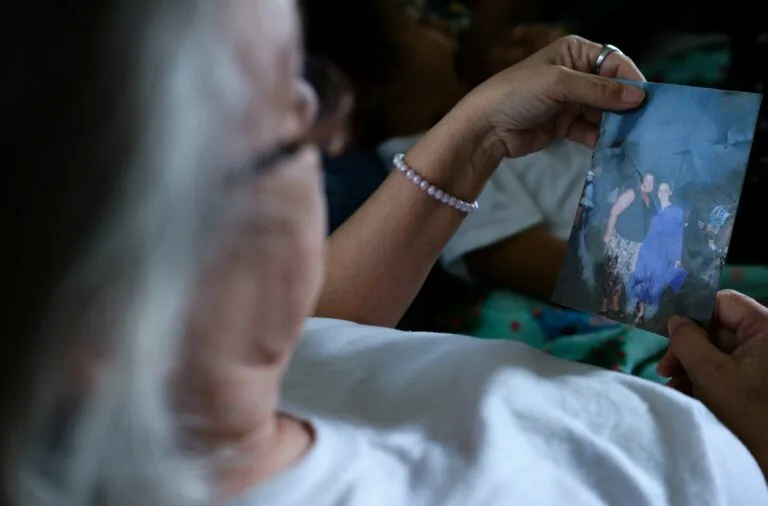
These States Are Using Fetal Personhood to Put Women Behind Bars
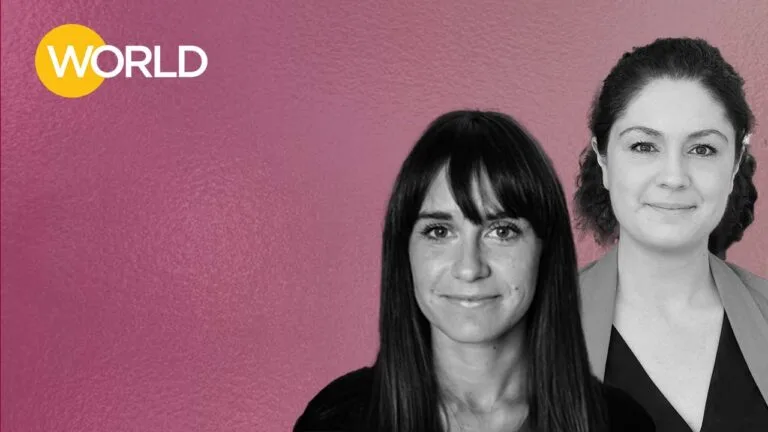
Video Q&A With ‘Tutwiler’ Producers: ‘When You’re Incarcerated and You Give Birth’

For Most Women Who Give Birth in Prison, ‘The Separation’ Soon Follows

Two Strikes

“Two Strikes” and “Tutwiler”
Related Stories

How One Alabama County Declared War on Pregnant Women Who Use Drugs

These States Are Using Fetal Personhood to Put Women Behind Bars

Video Q&A With ‘Tutwiler’ Producers: ‘When You’re Incarcerated and You Give Birth’

For Most Women Who Give Birth in Prison, ‘The Separation’ Soon Follows

Two Strikes

“Two Strikes” and “Tutwiler”
2018
Julia Tutwiler Prison for Women
Wetumpka, Alabama
SGT. EMILY ABBOT:
Come on, Cook! You got your seatbelt on?
MISTY, 36:
Yes ma’am.
EMILY ABBOT:
How far along are you now?
MISTY:
Nine months.
EMILY ABBOT:
Are you having a boy or a girl?
MISTY:
A boy.
EMILY ABBOT:
[Laughs] First one? Second one?
MISTY:
It’s my second boy.
My little boy’s been getting in trouble at school.
EMILY ABBOT:
How old is he?
MISTY:
He’s 10, and usually he’s good.
EMILY ABBOT:
He’s going through some stuff, but don’t let that be like—Don’t pity him to the point that you just spoil him.
MISTY:
I know I can’t do that. My husband passed away four years ago, and I let them get away with a bunch.
EMILY ABBOT:
Yeah.
MISTY:
Yeah. That’s where I messed up at.
EMILY ABBOT:
Have they been able to come to visit at all?
MISTY:
No, I wouldn’t want to put them through that.
EMILY ABBOT:
Yeah. I just feel bad when kids come because, you know, they have to be searched, too.
MISTY:
When I was a little kid, I remember we went to prison to see my dad, and it was crazy because I had Timberland boots that had little metal things on them, and the metal thing kept going off—
EMILY ABBOT:
Oh, mm-hmm.
MISTY:
—and I had to take my shoes off.
EMILY ABBOT:
Do you have a doula?
MISTY:
Yeah, mine’s Sarah.
EMILY ABBOT:
Yeah, we’re the only prison in the Southeast that has that program.
MISTY:
I know.
EMILY ABBOT:
I mean, you’re going to have someone there with you, but we’re complete strangers, you know what I mean? It’s different. They know you on a different level, and they can interact with you differently than we can.
Over the past four decades, women have been the fastest-growing population behind bars in the U.S.
Each year, thousands are pregnant.
FEMALE GUARD 1:
This is a nonsmoking dorm. We got pregnant females in here. I mean, come on. So do not smoke in this dorm, ladies.
WOMEN [in unison]:
Yes, ma’am.
FEMALE GUARD 1:
I’m starting at the end and work my way down.
Trim just a little.
FEMALE GUARD 2:
You’re running close on that hair, pull it up. And yours, too, your nails.
KAYLA:
That’d be the prenatal vitamin, Captain.
FEMALE GUARD 2:
Huh?
KAYLA:
Prenatal vitamins do that.
FEMALE GUARD 2:
OK, but you still got to clip your nails.
KAYLA:
Yes, ma’am.
FEMALE GUARD 2:
OK, good morning.
WENDY WILLIAMS, Deputy Commissioner, Women’s Services, 2014-21:
Tutwiler is the only women’s prison in the state of Alabama. But on average we have between 45 to 50 pregnant women in and out of Tutwiler in a year’s time. I know at one time we had three generations of women at Tutwiler that were from the same family, and of course we have that concern every time a woman comes to us pregnant. Is this going to be another cycle?
In 2016, Tutwiler began providing support to pregnant women behind bars through the Alabama Prison Birth Project.
The women in the program are serving time for crimes ranging from theft to assault, but most are in prison on drug-related charges.
CAPT. SONJA ROSE:
Capt. Rose to B Dorm officer. Get Misty Cook up and send her to the shift office.
SARAH DOYLE, Doula, Alabama Prison Birth Project:
What is your current age?
MISTY:
36.
SARAH DOYLE:
How long have you been in this facility?
MISTY:
Six months.
SARAH DOYLE:
And what is the length of your current sentence?
MISTY:
Thirty-six months.
SARAH DOYLE:
Not including your current incarceration, have you been in jail or prison before?
MISTY:
Mm-mmm.
SARAH DOYLE:
What is your highest level of education?
MISTY:
Eleventh grade.
SARAH DOYLE:
In the month before your arrest, were you employed?
MISTY:
No.
SARAH DOYLE:
Were you raised by someone other than your biological mother or father?
MISTY:
Yes.
SARAH DOYLE:
Yes. And who was that?
MISTY:
Grandparents.
SARAH DOYLE:
Grandparents. As an adult, have you ever been a victim of domestic violence?
MISTY:
Yes.
SARAH DOYLE:
Do you have children?
MISTY:
Yes, two.
SARAH DOYLE:
Yeah, two? [Laughs]
MISTY:
Plus the baby.
SARAH DOYLE:
Yeah. You’re just wanting to do the epidural and then whatever the doctor recommends. Just go with the flow, laying in bed, birthing on your back. And that’s what you’ve done before.
MISTY:
I want a big cup of Pepsi.
SARAH DOYLE:
A big cup of Pepsi, OK. Sometimes being a doula just means giving you your space, so you are always welcome to kick me out.
MISTY:
No, you’re staying there with me.
SARAH DOYLE:
OK, sounds good. [Laughter] I’m going to be around through this. You’re not doing this alone.
MISTY:
I know.
SARAH DOYLE:
Anything else I can help with today?
MISTY:
No.
SARAH DOYLE:
Great.
FEMALE PRISONER 1:
Coffee? Coffee, coffee, coffee.
ERIN BROWN, Doula, Alabama Prison Birth Project:
So this is the birthing care group. We’re the Alabama Prison Birth Project, and we come weekly. We do childbirth education. You’ll get a healthy meal, and then if you want to be matched with a doula, you can be matched with a doula for your birth.
ASHLEY LOVELL, Director, Alabama Prison Birth Project:
If it’s all right, we’ll just go ahead and start the lesson. To safely hold your baby, the baby’s head is close enough for you to kiss, right? It’s not just important for the baby, it’s important for us because it’s building that strong bond, and you’re more primed to bond to your baby at that moment than any other time. Again, if you’re separated from your baby for some reason, you can do this as soon as your baby comes back to you. Even if your baby is swaddled up in a little burrito and asleep, it’s OK to undo the swaddle and put your baby skin to skin. They will go right back to sleep here.
ERIN BROWN:
Well, let’s go on and—yes?
FEMALE PRISONER 2:
I just want to say, how many of us have had babies before? How many of you? Raise your hand.
FEMALE PRISONER 3:
I’ve had lots of babies.
FEMALE PRISONER 2:
What I think would be good is to talk about how we’re going to raise these babies. A lot of us go back and we’re like, “Breathing techniques?” I think the focus should be your baby and how you’re going to raise your baby and keep them and be a good mother and not have to go through what you went through.
Women typically get 24 hours or less with their newborn before being sent back to prison.
FEMALE PRISONER 4:
This is Antonio Ja’bar, and he’s in a shower. This is me and him kissing, but he’s still paying attention to the lady that took the picture of us. [Laughs] But that my sugarboo.
FEMALE PRISONER 5:
Look like she was praying right here. These are the last pictures I got, but I look at them over and over. And then I take them out and I look at them again and cry, and hide them again.
FEMALE PRISONER 6:
This is me and Tolin. This is the day that I was with him in the NICU. I was just praying with him here, praying that he would get better. He had swallowed some of my amniotic fluid whenever he came out, so he got an infection. So he’s got to take a full seven-day rounds of antibiotics, but this is that day. It was devastating, especially finding out that he was sick the night before, and the very next day knowing that I had to come back to prison. It just really broke my heart, knowing that I was leaving him there. It’s very hard.
FEMALE PRISONER 4:
Kayla, show my nephew.
KAYLA:
Well, this is Romeo. He’s a week and one day today, and I guess he’s still with DHR. So I don’t know where he at right now.
FEMALE PRISONER 7:
That’s a good picture.
KAYLA:
So, I don’t know. I don’t want to talk about it.
FEMALE VOICE:
We’re all rooting for him either way.
FEMALE PRISONER 4:
Yeah, we talk about him already. Don’t cry, it’s all right.
FEMALE PRISONER 7:
You going to get some answers here in a little while.
Tutwiler was long considered one of the worst women’s prisons in the U.S.
MALE NEWSREADER:
The Department of Justice is telling Alabama steps must be taken to curb sexual abuse at the Julia Tutwiler Prison for Women. The report called Tutwiler a “toxic, sexualized environment.” The facility in Wetumpka houses about 1,000 inmates.
A 2014 federal investigation found that more than a third of Tutwiler’s staff had sex with inmates.
WENDY WILLIAMS:
We had a lot of concerns at that time about Tutwiler. A lot of what we were hearing from the inmates was a fact that they weren’t feeling safe. So what we had to do, and we’re still working on this, is change the culture.
Tutwiler installed more than 300 security cameras and hired more female officers.
But the prison remained overcrowded and understaffed.
WENDY WILLIAMS:
I’m Wendy Williams, if you haven’t met me already.
Dept. of Corrections Meeting
WENDY WILLIAMS:
And I’m the deputy commissioner for women’s services and just super-excited that we have committed stakeholders that want to have a voice in our process. And I know Warden Wright and Warden McLean and I share a similar vision. When we build a new women’s prison, there will be an area where the mothers and babies can actually stay together from six months to a year post-delivery.
We have made a lot of great progress, but we still have a long way to go. We’re just now entering our fourth year of implementation with the DOJ settlement involving Tutwiler. We were compliant with 40 of 44 provisions, and the court report that will be filed by the 28th of this month will reflect that we are now compliant with 41. Those three are going to take a little bit more time. One of them will be accomplished with the help of University of Alabama and Auburn, hopefully. And then of course the other two are staffing, and that is a big challenge for us right now. We’ll look at some data behind that in just a moment. What about the doula program?
ASHLEY LOVELL:
There’s been a lot of interest in the lactation room. I have two emails now from other facilities wanting very specific details on how we implemented the program here, which is exactly what we’d hoped to see: Tutwiler doing something that caught on and is giving this opportunity to all of these babies—
WENDY WILLIAMS:
Who would have ever thought, right?
ASHLEY LOVELL:
—in the country, yes. And we hear that.
WENDY WILLIAMS:
Can you say that one more time? [Laughter]
ASHLEY LOVELL:
I will. Because we hear that. The hospital breastfeeding initiation rate where these women give birth is about 20%. And since we opened the lactation room in June, we have about a 50% initiation rate. So we’ve surpassed the hospital initiation rate, which is exciting.
CHRISTY, 38:
I’m currently on the breastfeeding program. Every day I’m over there multiple times a day pumping. It’s very quiet over there. In this place it’s never quiet.
I read my Bible and I pray and just kind of create my own little bubble and bless the milk so when it does get to her, you know. It keeps you connected with your child, keeps you focused on where you need to be to change ourselves so we can get home to our children.
And it’s much harder to pump than it is to breastfeed, so I usually only produce about 2 to 3 ounces at a time. I store it until they can ship it to her.
A lot of us have been abused our entire lives. And we enter into relationships of abuse, and then DHR wants to step in and say we can’t have our children because they’re going to enter into relationships of abuse. Well, help us, you know? Don’t just throw us off into prison or take our children. Actually help us.
All this wasted time.
FEMALE PRISONER 8:
The one bad decision that I made, it affected everything.
FEMALE PRISONER 9:
“Mama, when you coming home?” My child tell me that. “Mama, you come home and stop doing the things that you were doing.” To hear my child tell me that, you got to get your life together.
FEMALE PRISONER 10:
I just look at my—I’m so mad at myself and angry. To be on—[cries] to think about how angry that I am at me. It makes me angry. So I’m just angry at myself for not making the right decisions.
FEMALE PRISONER 11:
We’re all angry because we’ve put ourselves here, you know what I’m saying? It’s not the kids’ fault that we took ourself away from them. It’s helped me talk, to learn that I have to forgive myself for the mistakes that I’ve made.
CHRISTY:
You know, a common saying for being incarcerated is, “I came in here by myself, I’m going to leave by myself.” We all had little riders with us. And I’ve actually named my daughter Ariana Angel Rider.
Substance Abuse Program
JANEE ROBINSON, Drug treatment counselor:
All right. So you guys ready? So we’re celebrating baby Elijah, right? Yay, baby Elijah!
MISTY:
He’ll be here Thursday.
JANEE ROBINSON:
He’ll be here Thursday, by the way, so it’s a good thing that we are celebrating early, yes.
FEMALE VOICE:
Y’all ready? Little Miss Muffet sat on a tuffet, eating her blank and blank.
FEMALE VOICES [overlapping]:
Curds and whey. Yeah, that’s what I thought it was, curds and whey. Ice cream and cake.
FEMALE VOICE:
Peter, Peter, pumpkin eater, had a wife but couldn’t—
FEMALE VOICES [in unison]:
Keep her! [Laughter]
FEMALE VOICE:
He couldn’t what?
FEMALE VOICES [in unison]:
Keep her!
FEMALE PRISONER 12:
You ready?
MISTY:
Yes. No, but yes. Maybe.
FEMALE PRISONER 12:
You’ve got it. Turn around, let us see.
JANEE ROBINSON:
All right.
FEMALE PRISONER 13:
I know you so good.
MISTY:
I know.
FEMALE PRISONER 14:
That’s nice.
MISTY:
She got it, too. [Applause]
JANEE ROBINSON:
We’ve been in here right at an hour, believe it or not. How many people actually thought about using drugs or alcohol while we were doing? Is it possible for you to have activities like this and laugh and to celebrate without using?
FEMALE PRISONERS [in unison]:
Yes.
JANEE ROBINSON:
It is. And that’s what recovery is about, seriously.
FEMALE PRISONER 14:
I’m happy for her.
JANEE ROBINSON:
I am, too. I am, too. I am, too.
SONJA ROSE:
I hope that you tap into what you get here. You’re at the lowest. You’re at the bottom. And so if you can make it at that level you can always make it. That’s the thing. I think you misunderstand who you are with the power and the strength that you actually have and you don’t need someone else to confirm who you are. You have to confirm yourself, OK?
Let’s move on around because I’ve got a little gap here. There you go. There you go. Everybody say “cheese.”
FEMALE VOICE:
Make us look pretty. [Laughter] You can Photoshop it.
SONJA ROSE:
Baby.
FEMALE PRISONERS [in unison]:
Baby.
FEMALE PRISONER 15:
So, what’s been going on?
BRITTANY, 28:
Nothing much. My baby’s almost a month old now.
FEMALE PRISONER 15:
Really?
BRITTANY:
Yeah.
FEMALE PRISONER 15:
Do you have a boy or a girl?
BRITTANY:
A little boy.
FEMALE PRISONER 15:
A boy? What’s his name?
BRITTANY:
Tilon Dimber.
FEMALE PRISONER 15:
That’s pretty.
BRITTANY:
Yeah.
When I was 8, it was the first time I smoked marijuana. By the time I was 13 or 14, I was a full-fledged addict, used everyday. The first time I got locked up, I was 14.
I’ve been having, I guess, a little bit of depression and anxiety and just everything, knowing, OK, I just had a baby in prison and now I’m fixing to get back out to him, and what do I do from here? You know, how do I go forward? How do I stop making some of those same mistakes?
It’s really hard in here. There’s drugs everywhere. We can’t even go to the bathroom, you know? If you want to try to change your life and you’re an addict, how do you say no when it’s all in your face, you know? They just threw us behind bars, behind the fence, basically just to live with a whole bunch of addicts.
DOULA:
There’s some peach crisp for dessert.
At this hospital, I’ve seen them give IV narcotics right after the baby was born, which is something I’ve never seen at another hospital. And I’ve seen them offer Percocet even to a mom post-vaginal birth. So if you want to stay away from narcotics, for your recovering, you have to say that to them. And when we talk about fear, tension, pain, when you relax your body, it doesn’t hurt as bad when it’s contracting.
This is a poor pillow, I know.
CHAUNTEL NORRIS, Doula, Alabama Prison Birth Project:
As we’re starting to have contractions, the first thing your doula’s going to walk you through is breathing through it. That’s really really important. Because when we’re in pain, we all, “Ow!” You tense up and you stop breathing. That’s the first thing you do, right?
Take a deep breath in, relax your shoulders and breathe it out. In through your nose and out through your mouth. Very good. In through your nose and out through your mouth.
DOULA:
So what are some things, when you get home, that you plan to do differently so you don’t have to be back?
JENNIFER, 37:
Not to be back here? My goal, when I go home, I don’t want to come outside for a year.
DOULA:
But, OK, so—
JENNIFER:
But taking my baby to the doctor, that’s totally different.
DOULA:
Right. So you’re going to have to come out at some point. You’re going to have to take your kid somewhere. You’re going to have to go to the store. You’re going to have to become a part of society again. And so you need to have something in place to keep you out of trouble. I want us to come up with a good plan. “When I think I want to do this, this is what I’ll do instead.” And then we’ll set bigger goals.
JENNIFER:
Yeah, you’re right.
DOULA:
Set bigger goals. And it’s going to be [inaudible], our goal is to be available to our kids, you know what I mean? To be able to be a good mom to them, and to be present with them.
JENNIFER:
Yeah.
FEMALE PRISONER 16:
So I picked out this book, it’s called “I Love You Animally” and it’s just going to tell you how much I love y’all, OK? It says, “I love you hugely like a whale. I love you shyly like a quail. I love you cleverly like a fox.”
FEMALE PRISONER 7:
“I’ll float around inside my space shuttle. I’ll eat all my food in special gadgets. Could I be any of those things when I grow up? But I don’t need to decide just yet. I can just dream of having big adventures.” Leah, I love you. We’re almost to the end of this. [Cries] So I’ll see you soon.
FEMALE VOICE:
Anne thought Gilbert was cheeky—
JENNIFER:
Rodriguez, Mama wanted to talk to you today to let you know I’m so sorry that I had to go. I hope you come see me September the 8th, baby. Mama loves you so much. And be good to your grandma. Stop being bad, baby, OK? And be good in school and make good grades, Rodriguez.
CHRISTY:
I want them to know that not a day goes by that I don’t think of you. I think of you every day. I just pray to God that one day it can all be made right.
We’re scared. We’re scared because we don’t know what’s going on outside of these walls.
FEMALE PRISONER 5:
I wonder how much she weigh, and what she doing.
FEMALE PRISONER 17:
What is she doing? Does she sleep good?
FEMALE PRISONER 5:
Does she sleep good?
FEMALE PRISONER 17:
Is she happy?
FEMALE PRISONER 5:
Do she cry a lot?
FEMALE PRISONER 17:
Does—is she calling somebody else “Mom”?
FEMALE PRISONER 5:
What she like to eat? I think about all them questions.
Many of the women’s babies are placed with relatives or in foster care.
Some go to a private group home called Adullam House.
Adullam House
KENDISHA BROWN, Nursery caretaker, Adullam House:
This is her mom right here.
I can relate to the kids a lot because I was born drug-addicted to crack cocaine. My mom did drugs most of her life. And so society says that they’re throwaways and that there’s no hope for them, or they’re going to end up in the system, or they’re going to end up on drugs just like their parents. Show them the love that I didn’t get as a baby. Being held, being talked to. I didn’t have that, you know? So for me to be able to do that for these children has been like a healing for me.
When I look at her I think of me when I was a baby. And I look at me and I see her future. There’s hope for her. Right, Amiyah? There’s hope. [Laughs] There’s hope.
FEMALE VOICE 1:
Thank you. Excuse me.
FEMALE VOICE 2:
You going to have your baby? Oh, OK.
FEMALE GUARD 3:
[Laughter] Miss Dixon in. Which way we going, Miss Mist? You having a girl?
MISTY:
Boy.
FEMALE GUARD 3:
Boy.
CHRISTY:
You don’t want to give birth because you want to be able to at least feel them and have them with you.
FEMALE PRISONER 5:
You feel so empty. Your heart just stop.
FEMALE PRISONER 11:
It still hurts deep down inside because you had that bond. Twenty-four hours to bond with a baby is not really much.
FEMALE PRISONER 18:
When you were locked up your whole pregnancy, and it was just you and that baby, and then to walk away from the person that’s been there with you, it makes the strongest person break.
EMILY ABBOT:
I know. I’m sorry.
FEMALE VOICE [on loudspeaker]:
Last call for [inaudible].
EMILY ABBOT:
We have Sgt. Abbot, Lt. Nelson out with J3 Misty Cook en route to Baptist South Hospital. What are you naming him?
MISTY:
Elijah.
EMILY ABBOT:
That’s right. The little labor suite or whatever is way nicer than the room they’re going to put you in for postpartum. I’m just letting you know, don’t get attached. They’re only going to leave you in there for like an hour after the baby’s born.
MISTY:
An hour? And you go back to one of them little rooms again?
EMILY ABBOT:
Yes, Lord.
MISTY:
Thank you.
FEMALE PRISONER 5:
I always tell them, I say, “Y’all go and prepare yourself,” because, you know, you talk about you’re ready to go in labor, well, when you have your baby and spend time with him or her and it’s over, that’s like the hardest thing that ever done happened in the world.
24 Hours Later
FEMALE GUARD 4:
Line.
FEMALE GUARD 5:
6-0-3.
MALE GUARD:
I have 3-1-5-1-1-5.
FEMALE NURSE:
Bye, handsome. Thank y’all for taking such good care of my little buddy.
FEMALE ADULLAM HOUSE STAFF 1:
All right, bud. You ready to get in?
ELIJAH
Misty’s son
FEMALE ADULLAM HOUSE STAFF 1:
You are so alert. Look at you. OK, all right, almost got it.
FEMALE ADULLAM HOUSE STAFF 2:
Elijah, Elijah. Everybody’s waiting to see you.
Oh, OK, let’s see. There we go. There we go. OK.
Adullam House
FEMALE ADULLAM HOUSE STAFF 3:
He is beautiful. Baby! Hello, you. Look at those cheeks! Well, welcome home. Welcome home.
FEMALE ADULLAM HOUSE STAFF 4:
Oh, my goodness, oh, my goodness, oh, my goodness. Welcome.
FEMALE GUARD 6:
Welcome back!
MISTY:
I’m going to change in here.
FEMALE GUARD 6:
OK.
MISTY:
Is it bad? I can’t tell.
The Alabama Prison Birth Project continues to operate at Tutwiler.
Since 2018, the doulas have assisted in the births of more than 80 babies.
WRITTEN & DIRECTED BY Elaine McMillion Sheldon
PRODUCED & REPORTED BY Alysia Santo
EDITED BY Chad Ervin Elaine McMillion Sheldon
PRINCIPAL PHOTOGRAPHY Elaine McMillion Sheldon
ORIGINAL MUSIC Francois-Paul Aiche
SENIOR PRODUCER Carla Borras
ASSOCIATE PRODUCER Molly Born
ADDITIONAL EDITING Iva Radivojevic Molly Born
ADDITIONAL CAMERA Lily Keber Nisa East
ONLINE EDITOR/COLORIST Jim Ferguson David Bigelow
SOUND MIX Jim Sullivan Christopher D. Anderson, C.A.S.
ADDITIONAL MATERIAL WPMI NBC 15
SPECIAL THANKS Penelope Falk Leslie Simmer Curren Sheldon Kristen Nutile Sarah Ginsburg
FOR THE MARSHALL PROJECT
REPORTER Alysia Santo
EDITORIAL DIRECTOR Ruth Baldwin
MANAGING EDITOR Geraldine Sealey
EDITOR-IN-CHIEF Susan Chira
ORIGINAL PRODUCTION FUNDING PROVIDED BY Abrams Foundation, Park Foundation, John D. and Catherine T. MacArthur Foundation, FRONTLINE Journalism Fund with major support from Jon and Jo Ann Hagler through the Jon L. Hagler Foundation, additional support from Koo and Patricia Yuen, committed to bridging cultural differences in our communities. Major support for FRONTLINE and for Two Strikes and Tutwiler from the Corporation for Public Broadcasting. Additional support for Tutwiler from the Lisa & Douglas Goldman Fund.
FOR FRONTLINE
DIRECTOR OF POST PRODUCTION Megan McGough Christian
SENIOR EDITOR Barry Clegg
EDITOR Brenna Verre
EDITOR Joey Mullin
EDITOR & POST PRODUCTION COORDINATOR Tim Meagher
ASSISTANT EDITORS Christine Giordano Alex LaGore
PRODUCTION ASSISTANT Stevie Jones
FOR GBH OUTPOST SENIOR DIRECTOR OF PRODUCTION TECHNOLOGY Tim Mangini
INTERNS Joanna Hou
SERIES MUSIC Mason Daring Martin Brody
ADMINISTRATIVE ASSISTANT Ellen O’Neill
OPERATIONS SPECIALIST Will Farrell
DIRECTOR OF IMPACT AND EXTERNAL RELATIONS Erika Howard
SENIOR DIGITAL WRITER Patrice Taddonio
PUBLICITY & AUDIENCE ENGAGEMENT COORDINATOR Julia Heffernan
DIGITAL PRODUCER / EDITOR Tessa Maguire
MANAGER, PUBLIC RELATIONS AND COMMUNICATIONS Anne Husted
PODCAST PRODUCER Emily Pisacreta
ARCHIVES & RIGHTS MANAGER John Campopiano
BUSINESS ASSOCIATE Sean Gigliotti
FOR GBH LEGAL Eric Brass Suzy Carrington Jay Fialkov
SENIOR CONTRACTS MANAGER Gianna DeGiulio
BUSINESS MANAGER Sue Tufts
BUSINESS DIRECTOR Mary Sullivan
SENIOR DEVELOPER Anthony DeLorenzo
LEAD DESIGNER FOR DIGITAL Dan Nolan
FRONTLINE/COLUMBIA JOURNALISM SCHOOL FELLOWSHIPS TOW JOURNALISM FELLOW Kaela Malig
FRONTLINE/NEWMARK JOURNALISM SCHOOL AT CUNY FELLOWSHIP TOW JOURNALISM FELLOW James O’Donnell
FRONTLINE/MISSOURI SCHOOL OF JOURNALISM FELLOWSHIP MURRAY JOURNALISM FELLOW Kelsey Rightnowar
FRONTLINE/FIRELIGHT INVESTIGATIVE JOURNALISM FELLOWS Kevin Shaw Débora Souza Silva
ARCHIVAL PRODUCER Coral C. Salomón Bartolomei
EDITORIAL CONSULTANTS Lauren Prestileo Callie T. Wiser
SENIOR DIGITAL PRODUCER / EDITOR Miles Alvord
SENIOR DOCUMENTARY EDITOR & PRODUCER Michelle Mizner
DIGITAL EDITOR Priyanka Boghani
STORY EDITOR & COORDINATING PRODUCER Katherine Griwert
POST COORDINATING PRODUCER Robin Parmelee
SENIOR EDITOR AT LARGE Louis Wiley Jr.
FOUNDER David Fanning
SPECIAL COUNSEL Dale Cohen
DIRECTOR OF AUDIENCE DEVELOPMENT Maria Diokno
SENIOR PRODUCERS Dan Edge Frank Koughan
SENIOR PRODUCER, SPECIAL PROJECTS & INNOVATION Carla Borrás
SENIOR EDITOR & DIRECTOR, LOCAL JOURNALISM Erin Texeira
SENIOR SERIES PRODUCER Nina Chaudry
SENIOR EDITOR INVESTIGATIONS Lauren Ezell Kinlaw
MANAGING DIRECTOR Janice Hui
MANAGING EDITOR Andrew Metz
EXECUTIVE PRODUCER & EDITOR-IN-CHIEF Raney Aronson-Rath
A Requisite Media Film for FRONTLINE and The Marshall Project in association with WORLD Channel America ReFramed.
Copyright: 2020, 2023 WGBH Educational Foundation and The Marshall Project All Rights Reserved
FRONTLINE is a production of GBH which is solely responsible for its content.
Explore
Policies
Teacher Center
Funding for FRONTLINE is provided through the support of PBS viewers and by the Corporation for Public Broadcasting, with major support from Ford Foundation. Additional funding is provided the Abrams Foundation, Park Foundation, John D. and Catherine T. MacArthur Foundation, Heising-Simons Foundation, and the FRONTLINE Trust, with major support from Jon and Jo Ann Hagler on behalf of the Jon L. Hagler Foundation, and additional support from Koo and Patricia Yuen. FRONTLINE is a registered trademark of WGBH Educational Foundation. Web Site Copyright ©1995-2025 WGBH Educational Foundation. PBS is a 501(c)(3) not-for-profit organization.


